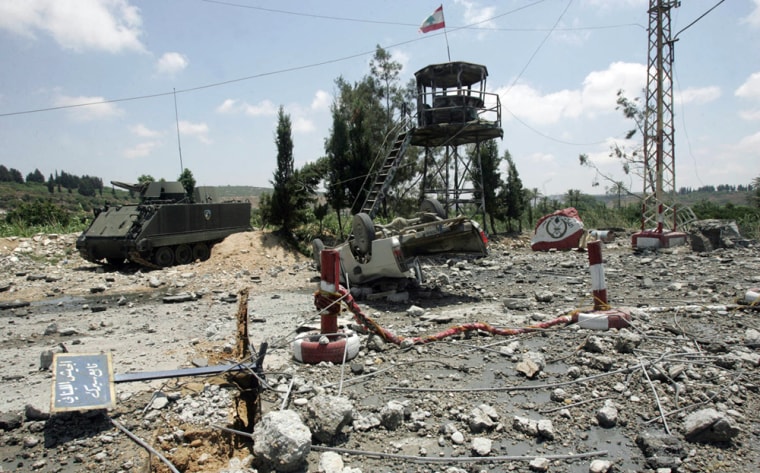ZARIT, Israel — , actions in which up to ten Israelis and two Lebanese were also reported killed.
Israeli Prime Minister Ehud Olmert described Hezbollah’s incursions as an “act of war” and promised a "very painful and far-reaching" response. So far, that has resulted in air assaults and counterattacks across the Lebanon border, ostensibly in a search for the captured soldiers.
NBC’s Martin Fletcher reports from the border on the escalation of tension in the area, which some fear could lead to full-scale war.
Hezbollah’s capture of the Israeli soldiers and Israel’s invasion of Lebanon represent a serious escalation of Middle East tensions. Are we witnessing the first acts of war here? What we are seeing the first act of is a very harsh Israeli response, one way or the other. I wouldn’t say it’s going to be all-out war, but the Israeli prime minister is in a real bind now.

The problem is that in the same way as Israel didn’t really have any direct leverage over Hamas in Gaza, it’s even more true in South Lebanon.
Basically, there aren't any real institutions of Hezbollah to attack. It’s very much an underground organization. So they can attack a few training grounds, maybe a Hezbollah building or two, or try to assassinate a Hezbollah leader. But, that’s not going to free their soldiers.
The only way Israeli believes it can free the soldiers is by putting pressure on the Lebanese government. That’s why Israel said that is an act of war by Lebanon and that Lebanon will bear the consequences.
So, what we’ll see is Israeli pressure on the Lebanese government. There are already war planes over Beirut and they’ll probably attack Lebanese infrastructure targets. Lebanon is very vulnerable because they have no real air defenses against Israel.
In the past, Israel has often demanded that the Lebanese government disarm the Hezbollah militia, which acts as a second army inside Lebanon. So, that’s the only leverage Israel has against Hezbollah — forcing the Lebanese government to act. Which, in the past, Israel has never succeeded in doing.
What are the goals of Hezbollah? Why did they enter into the fray here?
Basically, they are helping Hamas — that what it’s all about.
It’s also important to bear in mind that both Hezbollah and Hamas are in effect run by Iran. The radical branch of Hamas is lead by Khalid Meshaal, who is in exile in Damascus and is financed and inspired in large part by Iran. It’s Syria and Iran who also finance, inspire, and give logistical back-up to Hezbollah.
So, Hezbollah getting into the act is probably the work of Syria and Iran using their proxies to help each other.
Hezbollah has said its goal is to gain the release of soldiers, but is there any chance Israel will actually negotiate with Hezbollah?
We’ll have to wait and see what they say, but I doubt it. Israel wouldn’t negotiate with Hamas, and they are even less likely to negotiate with Hezbollah.
On the other hand, Israel is now in a bind. They now have three soldiers kidnapped by Islamic fundamentalist militias who have shown that they are very good in their military operations. The Hezbollah attack on the Israeli patrol today was clearly extremely sophisticated and successful.
Two Humvees were patrolling the northern Israeli border in a routine morning patrol. They were ambushed, at least three were killed, two kidnapped, four or five wounded.So that was a very successful attack by Hezbollah on the Israelis.
Israel began calling up reserve troops on Wednesday, signaling that this might turn into a large-scale campaign to go into Lebanon and retrieve these two soldiers. Would there be there be a lot of popular support in Israeli for a large-scale invasion into Lebanon if that’s what ended up happening?
Well, first of all we don’t know if it’s going to be a large-scale invasion. But there is certainly support for doing whatever it takes to get the Israeli troops back. That may well include ground forces going into south Lebanon.
That said, I’m sure that no one believes that they will actually get them back in that way. It will be more a matter of pressuring the Lebanese government than actually believing their ground troops will catch these people.
And Israel has already bombed several bridges in south Lebanon. An Israeli army statement said the air force has already attacked more than 30 targets in south Lebanon.
Israel is always trying to pressure the Lebanese government to reign in and disarm Hezbollah, but they’ve always failed. The thing to keep in mind is that Hezbollah is very well armed and reportedly has 10,000 rockets in south Lebanon, all of which can be fired towards Israel. And, they are not these crappy old Kasam rockets that Hamas is firing — they are sophisticated weapons that they have received from Syria. We’ll just have to see what happens next, but it could get very bloody.
How likely does it seem that this could spill into a bigger regional conflict? Especially with, as you said, Syria and Iran backing Hezbollah?
In the past, everyone has always pulled back from that. I think it is very unlikely that Israel and Iran will have any direct confrontation. It is possible that it could spill into Syria, although, unlikely.
The main thing will be pressure on Lebanon. Meanwhile, the Israeli cabinet is meeting tonight in a special session and during that meeting they will presumably give the green light to whatever the Israeli army plans to do. But, a big ground force invasion would not happen before the cabinet plans to meet because the cabinet always has to approve these things.
